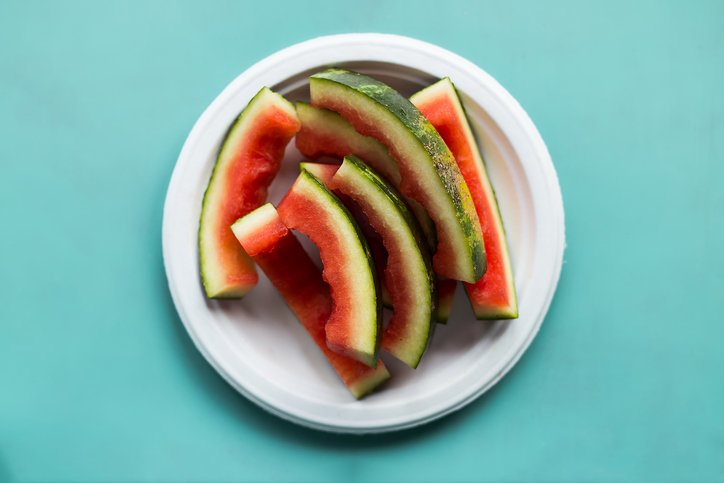Why I’m Making Watermelon Rind Pickles This Summer, And You Should Too!

Watermelon season is upon us. I cannot think of a more refreshing and satisfying summer treat. On a hot day, there’s nothing better than biting into the juicy flesh of a cool, fresh piece of watermelon. Like most people, I chuck the rinds into the trash. However, recently, I discovered that this “throwaway” part of the watermelon is actually very nutrient-dense and easy to incorporate into your healthy summer eating plans.

When one has tasted watermelon, he knows what the angels eat.” - Mark Twain
I know this sounds very odd, but hear me out. Pickling, also commonly called “brining,” is a food preservation technique that dates back to thousands of years when people did not have the convenience of refrigerators. You can pickle just about anything. Cucumbers are the obvious choice (in order to make pickles), but you might also be familiar with pickled beets, onions and okra.
There are a variety of ways (you can add different spices and your own flair) to make brine for pickling, but one of the most basic brines is just vinegar, water and salt (called vinegar pickling or quick pickling). A quick method for pickling red onions is just to immerse them in lemon juice.
If you Google watermelon rind pickles, so many different recipes will appear. Pick one that you like. I like this one, because it incorporates jalapeños for a spicy and sweet treat. Keep in mind that many brines do include sugar. If you need a brine without sugar, check out this recipe.
Watermelon rinds are edible and nutritious.
Watermelon rind has more potassium and fiber than the flesh! Potassium is an essential mineral that works with sodium to balance the fluid and electrolytes in the body. Potassium also helps keep blood pressure under control and may help reduce kidney stones and bone loss as you age. It may even reduce your risk of stroke. Fiber helps prevent constipation, aids in the health of the digestive system and gut microbiome and more.
The rind contains more L-citrulline (you can read all about this important amino acid here).
Also a good source of vitamins A and C. Vitamin A, an antioxidant, may help maintain healthy vision, especially as you age. Vitamin A may also maintain healthy skin and help with neurological and reproductive function. Vitamin C, also an antioxidant, helps protect the immune system from deficiencies that may lead to cardiovascular illnesses and other diseases. It is one of the most important nutrients needed for our survival.
Watermelon rind contains chlorophyll, a natural pigment found in plants that also has powerful antioxidant properties.
You can eat pickled watermelon rinds on their own, make a chutney or salsa, cut them up and sprinkle over a salad or use them as a fun cocktail garnish for your next summer party.

Watermelons are smiles of summer." - Unknown
Yes, you can eat the seeds too! Roast them in the oven for a simple, healthy snack or salad topping. These seeds are a good source of zinc, magnesium, iron and healthy fat.
As always, speak with a competent healthcare practitioner about introducing new foods to your diet (especially if you have any existing health issues or are pregnant or breastfeeding). It is also important to thoroughly wash the watermelon if you plan on consuming the rind. I like to wash the watermelon even if I am just eating the flesh. Placing unwashed produce on your kitchen counter or cutting boards is a sure way to spread germs and possibly foodborne illness.
Please let us know if you try making pickled watermelon rinds.
Enjoy your healthy life!
The pH professional health care team includes recognized experts from a variety of health care and related disciplines, including physicians, attorneys, nutritionists, nurses, and certified fitness instructors. This team also includes the members of the pH Medical Advisory Board, which constantly monitors all pH programs, products, and services. To learn more about the pH Medical Advisory Board, click here.
By Joy Stephenson-Laws, J.D., Founder







